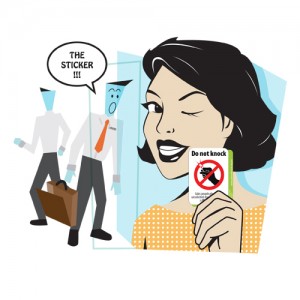Media release: Don’t harass us at home, say consumers

Consumer Action Law Centre has today launched a campaign to assist consumers to avoid door-to-door marketers if they wish to do so. The campaign will distribute a ‘Do Not Knock’ sticker, which warns sales representatives that they are in breach of the law if they knock on a door to which the sticker is affixed.
Consumer Action has launched the campaign in response to increasing complaints relating to door-to-door marketers through Victoria. Direct marketers, including door-to-door marketing, operate across a number of industries, including energy, education and telecommunications.
‘Where a consumer has this sign displayed clearly at the front of their house, and a salesperson enters, that may be trespass’ said Gerard Brody, Consumer Action’s Director of Policy & Campaigns.
‘We see many cases where door-to-door salespeople use unfair tactics including lies and unfair pressure in order to obtain a sale. We’re distributing the sticker to assist consumers protect themselves from door-to-door marketers should they wish to’.
The campaign also involves the release of a case study report entitled ‘Coercion and harassment at the door: Consumer experiences with energy direct marketers’, produced jointly with the Financial & Consumer Rights Council. Competition in the deregulated energy market has lead to intense marketing by energy retailers aiming to increase their market share. The report details the stories of 28 consumers who were lied to, taken advantage of or harassed when direct marketed.
‘The case study report demonstrates that many consumers are experiencing significant difficulties in the competitive energy market. Some vulnerable consumers are unable to say no to direct marketers, while others are simply being deceived in order to gain a sale’ said Mr Brody. ‘We are concerned that this sort of marketing limits the ability of the market to bring about outcomes that are in consumers’ interest’.
The Australian Energy Market Commission is reviewing the effectiveness of competition in Victoria’s energy market. In its draft report released in October, the Commission said that its preliminary view is that the market is effective. If confirmed, this will lead to the removal of pricing protections.
‘The AEMC appear to believe that a consumer who opens their door to a marketer is an informed consumer’ said Mr Brody. ‘They have ignored the evidence of widespread and systemic misconduct by marketers’.
END

